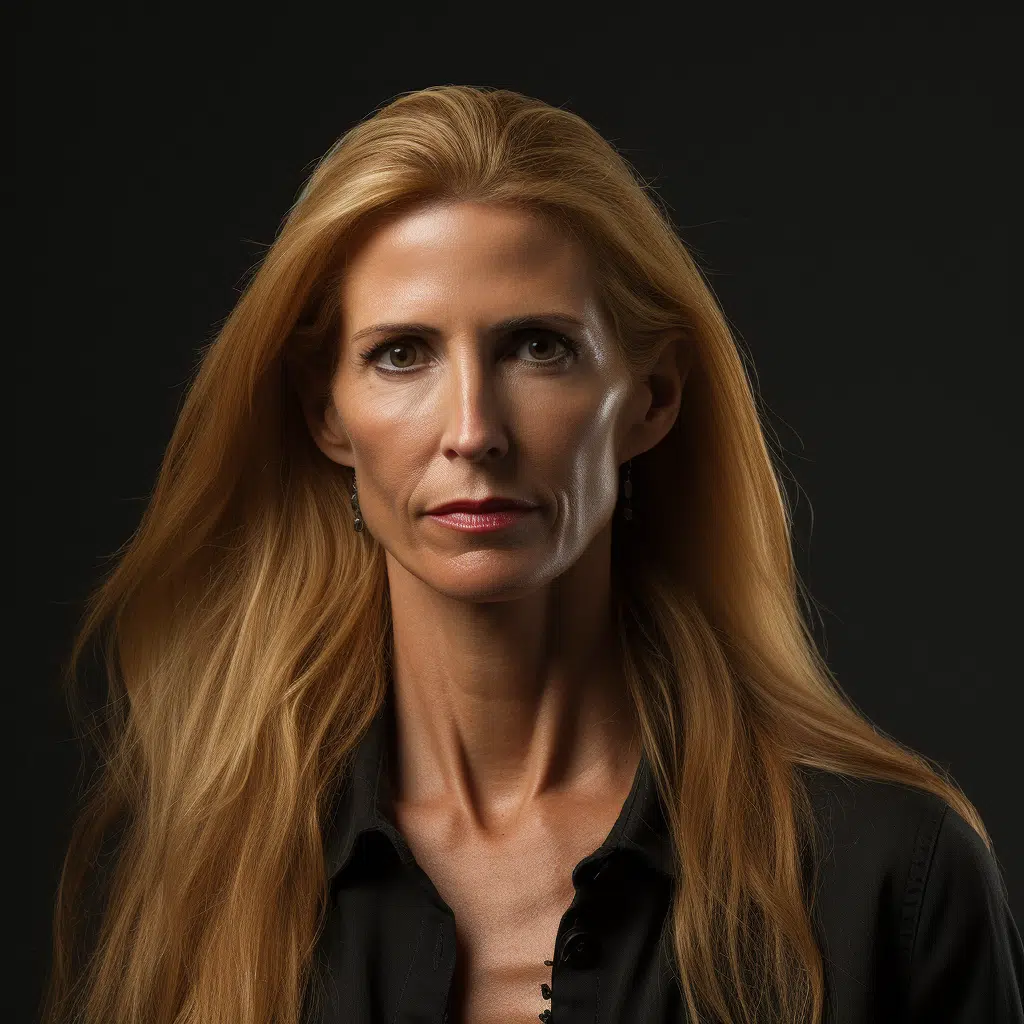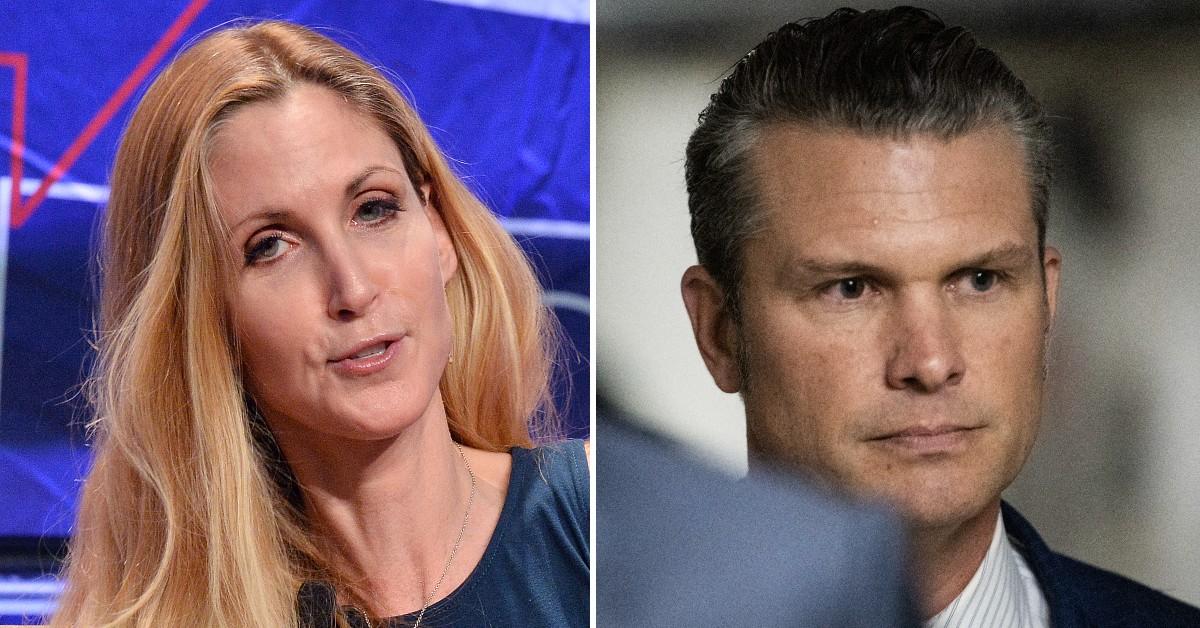Ann Coulter And Pete Davidson: The Unlikely Political Collision
When it comes to politics, few pairings spark as much curiosity as Ann Coulter and Pete Davidson. These two personalities couldn't be more different—Coulter, the conservative firebrand known for her sharp tongue, and Davidson, the liberal comedian famous for his edgy humor on Saturday Night Live. Yet, their interactions have become a fascinating spectacle in the world of media and politics. In this article, we'll dive deep into their dynamic, exploring how their contrasting views have created some of the most memorable moments in recent pop culture history.
Picture this: one’s a staunch Republican who doesn’t shy away from controversial opinions, while the other is a millennial comedian who uses humor to challenge societal norms. Their encounters are like a political version of oil and water, yet they somehow manage to create waves that ripple through the media landscape. This clash isn’t just about politics—it’s about generational differences, media influence, and the evolving nature of public discourse.
So, why does this matter? Because in today’s hyper-polarized world, understanding how figures like Ann Coulter and Pete Davidson engage with each other gives us insight into the broader cultural divide. It’s not just about their personal opinions; it’s about how they represent larger ideological battles playing out in real-time. Let’s jump into it, shall we?
Read also:Hudson Valley Healing Arts Center Your Ultimate Destination For Holistic Wellness
Table of Contents
- Biographies: Ann Coulter and Pete Davidson
- Their Political Views
- Media Presence and Influence
- Their Notable Clashes
- Social Media Feuds
- Impact on Public Discourse
- The Generational Gap
- How Media Covers Their Interactions
- What the Future Holds
- Conclusion
Biographies: Ann Coulter and Pete Davidson
Ann Coulter: The Conservative Icon
Ann Coulter is no stranger to controversy. Born on December 8, 1961, in St. Louis, Missouri, she’s carved out a niche as one of the most outspoken conservative commentators in America. Her career has spanned writing, speaking, and media appearances, where she’s never afraid to voice her strong opinions.
| Full Name | Ann Elizabeth Coulter |
|---|---|
| Birthdate | December 8, 1961 |
| Profession | Author, Commentator, Lawyer |
| Notable Books | Treason, Adios, America!, Godless |
Coulter’s writing often focuses on her critiques of liberalism, immigration policies, and what she perceives as the decline of traditional values. She’s not just a talking head—her legal background adds depth to her arguments, making her a formidable force in political debates.
Pete Davidson: The Comedian with a Cause
On the flip side, we have Pete Davidson, born on November 16, 1993, in Staten Island, New York. Davidson’s journey to fame began at a young age, joining Saturday Night Live in 2014 and quickly becoming a fan favorite for his raw, unfiltered humor.
| Full Name | Peter Michael Davidson |
|---|---|
| Birthdate | November 16, 1993 |
| Profession | Comedian, Actor, Writer |
| Notable Works | Saturday Night Live, Big Time Adolescence |
Davidson’s comedy often tackles sensitive topics, including mental health, relationships, and politics. His liberal leanings are evident in his work, particularly when he takes aim at conservative figures through his jokes. Despite his young age, Davidson has become a voice for his generation, blending humor with social commentary.
Their Political Views
Understanding the political views of Ann Coulter and Pete Davidson is key to grasping their dynamic. Coulter represents the traditional conservative mindset, advocating for policies that align with Republican ideals. On the other hand, Davidson embodies the progressive millennial perspective, using humor to challenge the status quo.
- Ann Coulter: Strong advocate for gun rights, immigration control, and limited government intervention.
- Pete Davidson: Supports progressive policies such as climate change action, social justice, and LGBTQ+ rights.
Their opposing views create a perfect storm for public discourse, with each side representing different ends of the political spectrum. This clash isn’t just about policy—it’s about values, identity, and the future direction of the country.
Read also:Pete Crow Armstrong Wallpaper Elevate Your Screen With Iconic Style
Media Presence and Influence
Ann Coulter: The Media Darling
Coulter’s presence in the media is undeniable. She’s a regular guest on Fox News, where her fiery commentary draws both praise and criticism. Her ability to articulate complex issues in a way that resonates with her audience has made her a household name in conservative circles.
Her influence extends beyond television, with millions of readers devouring her books and essays. Coulter’s knack for turning complex political issues into digestible soundbites makes her a go-to source for conservative commentary.
Pete Davidson: The SNL Star
Meanwhile, Davidson’s media presence is centered around Saturday Night Live, where he’s become a cultural icon. His sketches often tackle political themes, using humor to highlight the absurdities of modern life. Davidson’s influence lies in his ability to connect with younger audiences, who see him as a relatable voice in an increasingly polarized world.
His social media following is also massive, with millions of fans tuning in to see his latest jokes and updates. Davidson’s platform allows him to amplify progressive causes, making him a key player in the media landscape.
Their Notable Clashes
Over the years, Ann Coulter and Pete Davidson have had their fair share of run-ins. One of the most memorable moments occurred when Davidson took a jab at Coulter during an SNL monologue, calling her out for her controversial statements. Coulter didn’t take it lightly, firing back with a series of tweets that went viral.
This back-and-forth became a media sensation, with both sides doubling down on their positions. For Coulter, it was an opportunity to defend her principles against what she saw as an attack on free speech. For Davidson, it was a chance to highlight the absurdity of Coulter’s rhetoric through humor.
Social Media Feuds
Social media has become the battleground for many modern feuds, and Ann Coulter vs. Pete Davidson is no exception. Coulter’s Twitter feed is a treasure trove of sharp-witted commentary, often targeting liberal figures like Davidson. Her tweets are crafted to provoke reactions, sparking heated debates among her followers.
Davidson, on the other hand, uses social media to share his personal experiences and humorously respond to critics. His interactions with Coulter have become a source of entertainment for many, showcasing the power of wit and sarcasm in public discourse.
Impact on Public Discourse
The interactions between Ann Coulter and Pete Davidson have had a significant impact on public discourse. They highlight the growing divide between conservatives and liberals, showcasing how each side approaches political issues. Coulter’s intellectual arguments and Davidson’s comedic take on politics offer two distinct perspectives that resonate with different audiences.
Moreover, their clashes serve as a microcosm of the larger cultural battles playing out in society. From immigration to social justice, their discussions touch on issues that matter to millions of Americans. This makes their dynamic not just entertaining but also informative, providing insights into the complexities of modern politics.
The Generational Gap
One of the most intriguing aspects of Ann Coulter and Pete Davidson’s dynamic is the generational gap between them. Coulter represents the older generation, shaped by traditional values and a more rigid worldview. Davidson, meanwhile, embodies the younger generation, characterized by its openness to change and willingness to challenge the status quo.
This generational divide is evident in their approaches to politics. Coulter’s arguments often rely on historical precedent and established norms, while Davidson’s humor reflects the fluidity and adaptability of modern society. Their interactions highlight the challenges and opportunities of bridging this gap, offering lessons for both sides.
How Media Covers Their Interactions
Media coverage of Ann Coulter and Pete Davidson’s interactions varies depending on the outlet. Conservative-leaning media tends to highlight Coulter’s arguments, framing her as a defender of traditional values. Meanwhile, liberal media often focuses on Davidson’s humor, portraying him as a voice for progressive change.
This polarized coverage reflects the broader media landscape, where narratives are often shaped by ideological biases. However, some outlets strive for balance, presenting both sides of the story and allowing readers to form their own opinions. This approach is crucial in fostering informed discussions and promoting understanding across the political spectrum.
What the Future Holds
As politics continues to evolve, the dynamic between Ann Coulter and Pete Davidson will likely remain a focal point in public discourse. Their interactions serve as a barometer for the state of political dialogue in America, reflecting both the challenges and opportunities of engaging across the aisle.
Looking ahead, it’s possible that their clashes will become even more frequent, especially as social media continues to amplify voices on both sides. However, there’s also hope for dialogue and understanding, as both Coulter and Davidson have shown moments of respect for each other’s perspectives.
Conclusion
In conclusion, the relationship between Ann Coulter and Pete Davidson is a fascinating study in contrasts. Their interactions highlight the complexities of modern politics and the importance of engaging with differing viewpoints. By examining their dynamic, we gain valuable insights into the cultural and generational divides shaping our world today.
So, what can you do? Start by engaging in respectful conversations with those who hold different opinions. Share this article with friends and family, sparking discussions that promote understanding and bridge divides. And remember, whether you’re a Coulter fan or a Davidson supporter, the key to progress lies in listening and learning from each other.
What are your thoughts on this dynamic duo? Leave a comment below and let’s continue the conversation!
Article Recommendations


